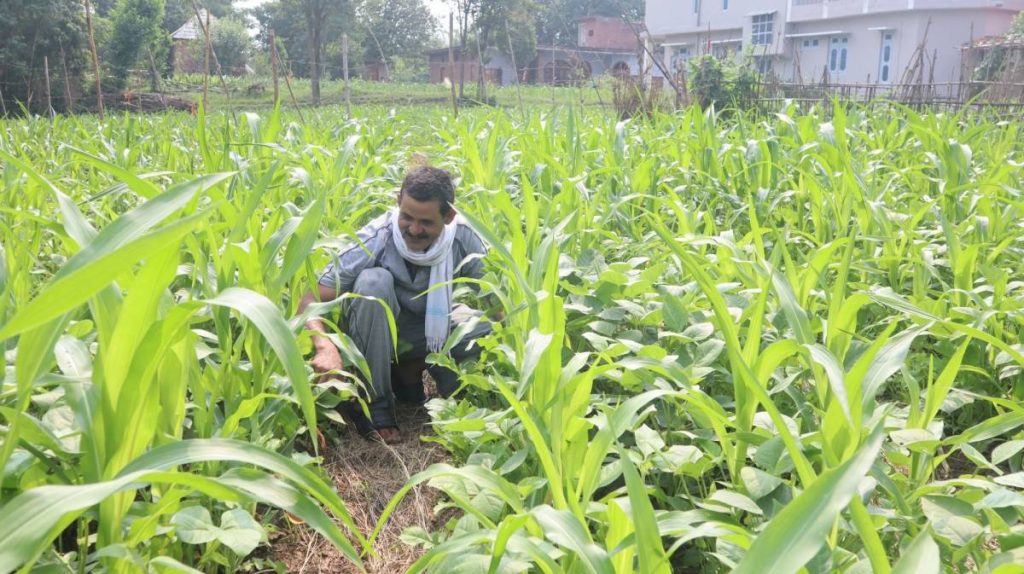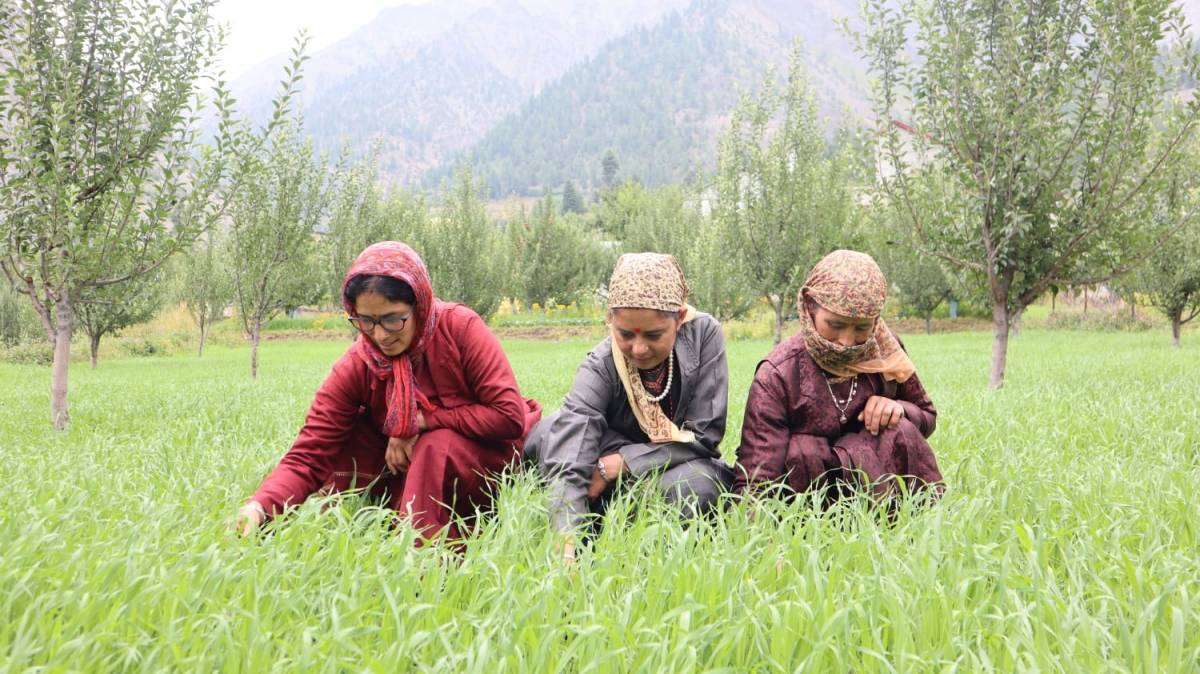The SPNF technique has been conceptualized by Padma Shri recipient Subhash Palekar….Reports Vishal Gulati
The north-western Himalayan state of Himachal Pradesh is going back to the roots the natural way as 13 per cent of the farmers have adapted to low-cost farming techniques in just three years, say officials.
The non-chemical climate-resilient Subhash Palekar Natural Farming (SPNF) technique is being promoted under a state-led programme to meet the objectives of the Prakritik Kheti Khushhal Kisan Yojana Project since 2018.
The SPNF technique has been conceptualized by Padma Shri recipient Subhash Palekar.
As per government records, 129,299 farmers, roughly 13 per cent of the total, have switched over to the SPNF practice, largely on a small portion of land, in the state where 10.84 per cent of land holdings are owned by semi-medium and medium farmers and just 0.30 per cent by large farmers.
Those who adopted natural farming include 12,000 apple growers. The total area under the SPNF is 7,456 hectares. However, the number of farmers who have been trained to adopt the technique is 135,172.
Experts say the SPNF technique cuts dependence on the external market and is based on indigenous cows. The farmers can prepare the sprays from the urine and dung of the cow at the farm itself and just need some local resources like plant extracts, jaggery and gram flour. It reduces the water requirement of the crops too.

The natural farming checks plant diseases and the produce is chemical free and healthy.
The farmers have reasons to practice a type of farming that involves elimination of chemical pesticides, sustaining agriculture with eco-friendly processes and restoring soil fertility and organic matter.
“With chemical sprays, the expenditure was increasing every year and the production was either stagnant or falling. Even the produce was not healthy due to excessive use of chemical fertilizers and pesticides. So I decided to switch over to natural farming,” Surender Pirta, an apple grower in Jubbal area of Shimla district, said.
Pirta said initially he was apprehensive about the success of natural farming. “But when I saw the results with the cultivation cost coming down drastically, I adopted natural farming on the entire 55 bighas of land.”
He said earlier he was spending Rs 3 lakh on chemical fertilizers and pesticides in his orchard. “The cost has now come down to Rs 50,000.”
His income has risen from Rs 12 lakh to Rs 15 lakh with the shift from chemical to natural farming in the past two years.
Another farmer Ajay Rattan, an engineer by profession from Ghumarwin in Bilaspur district, said he was looking for a low-cost farming alternative owing to economic and health hazards.

He found the SPNF handy and productive since he adopted it three years back on the entire 25 bighas of land. Now he is annually earning Rs 5 lakh from agriculture with an outlay of Rs 3,000.
Earlier, he used to spend Rs 30,000 on the same land and his income was a meagre Rs 40,000.
“I don’t have to buy any farm input from the market now. I prepare them on my farm. The natural farming has a positive impact on human health, whether farmers or the consumers, and it improves the soil health and ecosystem too,” he said.
Rattan grows sugarcane, gram, wheat, peas, soyabean, moong, taro root, ginger capsicum and gourd. “I grow vegetables on five bigha and I don’t have to go to the market to sell the produce grown with the natural farming technique. The buyers come to my farm and purchase directly. I have got more than 200 consumers who want to buy chemical-free vegetables only.”
Many farmers have shifted to the SPNF technique after they initially tried it on a small portion of land and saw good results. The switch over from chemical farming to natural farming has not only helped many farmers get rid of the need of agro credit from sellers of chemical fertilizers and pesticides, but has come as a major life saviour for others who were having serious health problems while spraying chemicals in the farm.
“I do much of the work on the apple orchard myself because of economic reasons. However, when I had health issues because of chemical sprays, it depressed me as the orchard was the only source of income for me and my daughter. It also made me think of the ill-effects of such apples on the consumers,” said Satya Devi, who has been managing an apple orchard on two bighas of land all alone for many years with chemical farming.
A number of farmers, including Ajay Rattan, who are practicing SPNF after training, are keenly spreading the concept further among fellow farmers.
Prakritik Kheti Khushhal Kisan Yojana Executive Director Rajeshwar Chandel said scientific studies show that the SPNF technique has led to cost reduction of 56.5 per cent in apples, 28.1 per cent in wheat and 45.5 per cent in fruits, pulses and vegetables.
There has been a 27.4 per cent increase in net returns in apples, 63.6 per cent in wheat and 21.5 per cent in fruits, pulses and vegetables.
The studies show up to nine crops are being grown concurrently by the farmers leading to crop intensification and crop diversity and 15 types of companion crops are being grown in apple orchards.

More so, the incidence of fungal diseases like scab in apple and yellow rust in wheat is lower with regard to the conventional practices. The farmers observed that SPNF crops have better drought resistance and better taste and flavour than chemically grown crops.
The State Project Implementation Unit is in continuous touch with the farmers who have adopted SPNF, for consolidation and solution to the issues emerging day to day. This system worked pro-actively even amidst the Covid-19 pandemic. The ultimate objective is to bring all the farmers into the natural farming fold as well as socio-economic benefits.
State project Director Rakesh Kanwar said that the focus now is to increase the area under natural farming on a mass scale.
“Still those who have adopted have been practicing natural farming on a small portion, say one-third of the farm, and this is the major challenge. Once the farmers start getting better results with reduced direct costs, boosting yields and also incentivized by the market, this will bring behavioural change to stop the use of costly fertilizers and pesticides that is degrading the soil and leading to health hazards,” he explained.
Also, he said, efforts are afoot to work out self-assessed certification by the farmers for natural produce along with developing a mechanism for farmer-consumer connect.
The NITI Aayog has already taken note of the state government’s innovative ways to promote natural farming. The state is also in a leadership role for outreach of natural farming in the country.
Besides, the state is partnering and engaging global organizations, which are custodians of Sustainable Food Systems, including the Food and Agriculture Organization (FAO), a specialized agency of the United Nations.
Vegetable production in Himachal Pradesh is generating revenue of Rs 3,500 crore to Rs 4,000 crore annually and has emerged as an alternative economic activity in the horticulture sector.
As per government estimates, off-season vegetables give a net return from Rs 60,000 to Rs 2 lakh per hectare whereas the traditional crops fetch from Rs 8,000 to Rs 10,000 per hectare.














